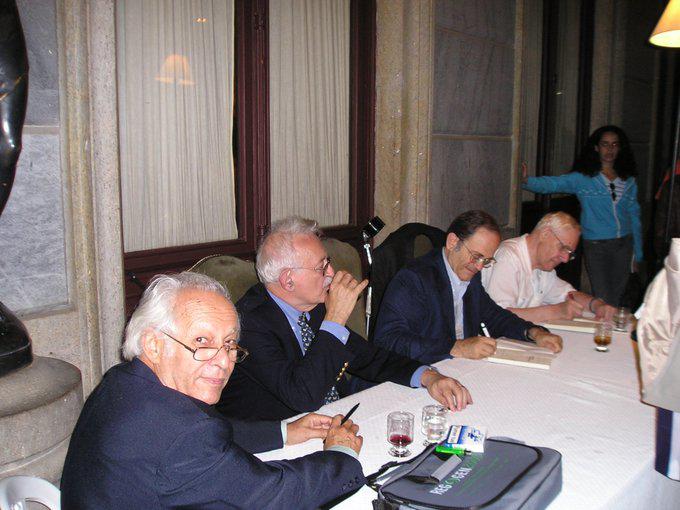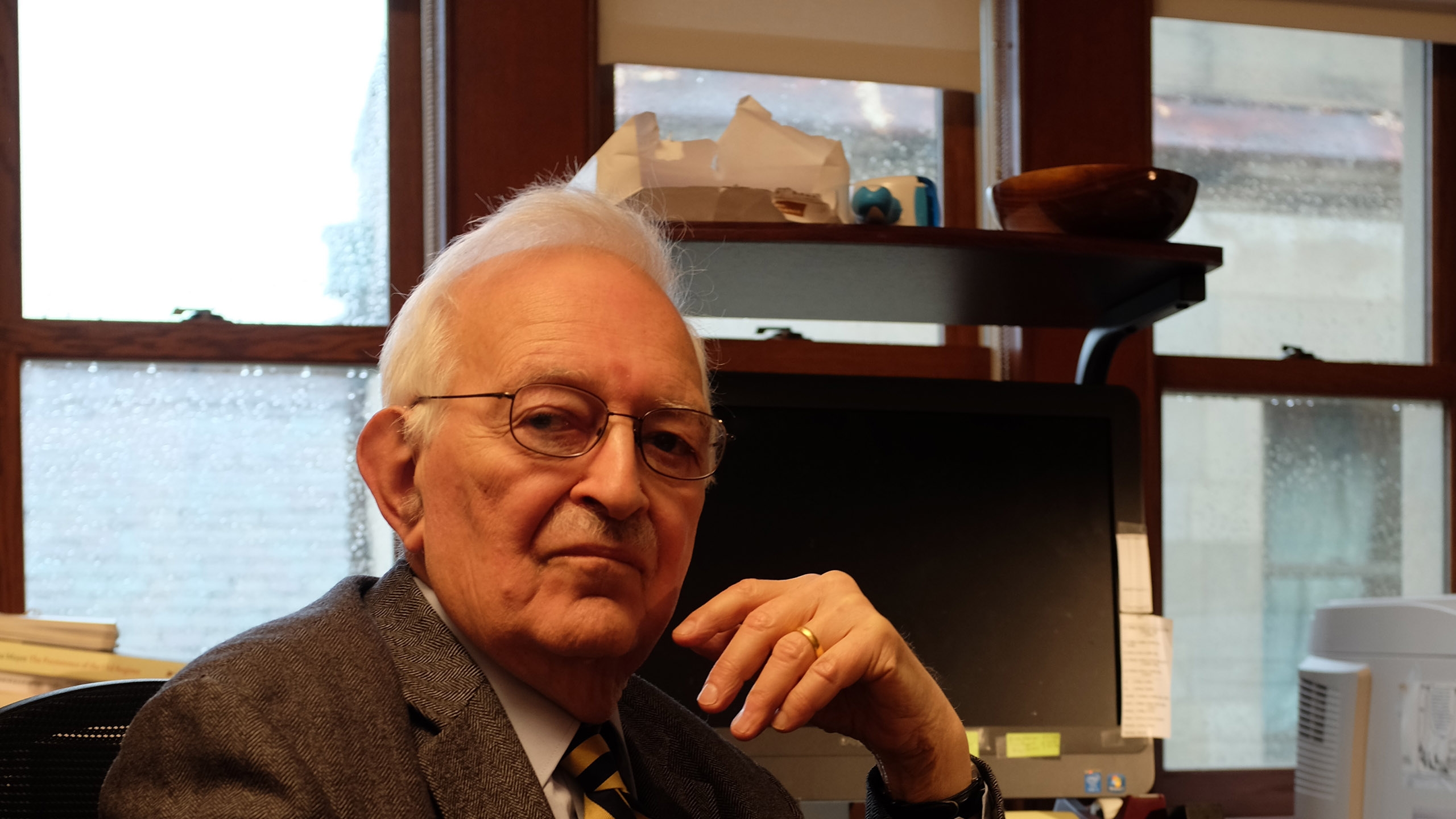In memory of historian, sociologist and world-systems theorist, Immanuel Wallerstein, who passed away recently at the age of 88.
Immanuel Maurice Wallerstein, historical social scientist, anti-colonial militant, world systems theorist, intellectual provocateur and polymath, has passed – and with him has passed the last giant of the golden age of anti-Eurocentric history. Wallerstein was born in 1930, educated at Columbia, from where he successively received BA, MA, and PhD degrees by 1959. From his early adulthood, he was seasoned and beguiled by national liberation struggles, reading the texts of Nehru and Gandhi, attending youth congresses alongside participants from African countries in the heat of anti-colonial militance. His earliest works focused on colonial and post-colonial African governments, including a number of neglected monographs and co-authored document collections on the African liberation movements.
From his earliest intellectual and political engagements, he was against Eurocentrism. He felt the struggle against Western domination by the rest of the world was paramount. By the late 1960s, he was already groping towards an escape from methodological nationalism, or the idea that one could understand nations and societies as wholly discrete entities, in analytical quarantine from the surrounding world. With his underknown collaborator and methodological genius-accomplice Terence Hopkins, he saw that “supra-national” processes were molding and pressuring national societies, then emerging as the notional and natural unit of analysis for historical social science. In the wake of Columbia’s repression of the 1968 protests, Wallerstein left, to end up at McGill and then SUNY-Binghamton, where he founded the Fernand Braudel Centre and turned that old industrial town into a world centre for historical sociology and world-systems theory.
The choice of name was not innocent. Wallerstein was in perpetual dialogue with Braudel, convinced that his longue durée perspective on world history, in which space was so important, and in which change took a very, very long time to work itself out, was correct. Frantz Fanon was another constant interlocutor and the object of numerous essays and defences. If Braudel instilled in Wallerstein the need to re-think social science in terms of big systems, Fanon was amongst the most powerful and fervent voices from the South, from the victims of the systems Wallerstein was exploring. What the latter learned from the former was the need to rethink revolutionary subjectivity, and to do so by listening to those who were engaged in burning struggle in the periphery itself. From him and the national movements which provoked and took up his thought, Wallerstein developed a far broader idea of social agency than the sterile ideal-typical industrial proletariat-capitalist dyad.
Fanon, of course, killed by cancer, had only began to sketch out the trials and tribulations of post-colonial social advance. Impelled and nudged by the analytical puzzle of post-colonial Africa, Wallerstein began to try to understand how the world had come to be the way it was, how colonialism had emerged as such a dominant force. In 1974, he released the first of what would be his four-volume magnum opus of world-systems theory: The Modern World-System: Capitalist Agriculture and the Origins of the European World-Economy in the Sixteenth Century, alongside a seminal essay: “The rise and future demise of the world capitalist system: Concepts for comparative analysis.” Wallerstein broke with the liberal, nation-based melioristic epistemology which had been the basis of social science, or as he came to see it, sciences useful for the technocratic management of social systems.
He wrote these works with his head in the past, his heart in the present, and his hopes in the future. Recasting the origins of the world-system and agriculture as world-historical would write against parochial fundamentalisms which insisted that one could locate the origins of capitalism in markets for land in a cold, wet, and grey island in the Atlantic, which (supposedly, irrelevantly for such neat models) was a global empire, sitting astride tremendous flows of spices, specie, sugar, and slaves. At a moment when modernisation theories filled the sky of asocial science, Wallerstein insisted with a clarion’s volume that “modernisation” in some lands – soon more smoothly rendered as the “developed” nations – was a world-historical process which rested on underdevelopment elsewhere. If the accumulation of capital in some places in the world-system rested on dis-accumulation in other places in the world-system, it was nonsense to imagine that development could possibly retread the paths of the so-called developed nations.
Structuralist and dependency economics had by then begun to account for the problems facing peripheral development. Wallerstein’s world-system was essentially a scaling-up of structuralist economics – with its two basic units, “core” and “peripheral” social formations, the one heavily exploiting the other primarily by unequal exchange – into a world-system. Moving to the world-scale, insisting that the determinations of any given concrete were global and world-historic, was an unmistakable and epochal restructuring, rethinking, or undoing of liberal social science, including formally Marxist variants.
If the unit of analysis was the world-system, it could work like a solvent on congealed theoretical puzzles like the articulation of modes of production, or stagist theories which demanded societies pass through capitalism before socialism, or finally is-it-or-isn’t-it questions of whether given “social formations” were socialist, state-socialist, state-capitalist, deformed, capitalist, and so on. By expanding the unit of analysis, modes of labour control were just that: ways of extracting surplus in a capitalist world system. And metastasising typologies of political systems went to the dustbin, replaced by the idea that it was better to understand the more radical amongst them as localised attempts to challenge the law of value, with consequences for their populations and the world-system as a whole.
Wallerstein’s intellectual presence was like a juggernaut, breaking down unbreakable walls. But sometimes, brute intellectual force and theoretical élan took the place of rigorous systematic formulation. Critique has showed that his work seemed to rest on some uneasy functionalisms. Perhaps more importantly, his devastating dismissal of national development as a phantasm, a fantasy of inclusion in a system which by its nature excluded, may have brought its own blinders.
He may, by leaning on Kondratieff cycles rather than class power, have underestimated the degree to which post-1973 saw a global counter-revolution. As he showed empirically but often not conceptually, the small post-colonial gains of the Third World were slowly, and then with more speed after 1990, erased – testament to whether his assertion that the late USSR was essentially capitalist really held up, and clarifying that it was more likely staving off a new “moment” in the world system in which core accumulation again rested on historic dis-accumulation and de-development in the periphery and the former Second World. His enchantment with the “new” social movements and the real vibrancy at the theoretical level of post-1968 socio-political practice, too, may have obscured the degree to which 1968 was birth of a new brand of anti-systemic politics and perhaps a death knell for state projects, in the Middle East, for example, which created some safe berths from the storms of peripheral capitalism. If he was right about the limits of the statist anti-systemic projects, he was perhaps less so about what they had achieved, in particular in warding off what his collaborator, Samir Amin, called the “obsolescent” imperialism of generalised monopolies. Still, in retrospect the correctness of each and every one of his theoretical formalisations is less relevant than the massive space he helped open in western social science to enter into dialogue with southern social science.
From the 1970s he moved briskly forward, elaborating, clarifying, polemicising, as one of the key figures clawing open a space in the western academy which had been opened in the world-system by national liberation movements. He collaborated with Giovanni Arrighi - who also spent time at Binghamton- Amin, and Andre Gunder Frank. Here again the African struggles were central, for it has been under-remarked that three-fourths of this Gang of Four were rooted by birth, training, teaching, or area interest, in Africa: the zero-point of world-systemic accumulation, successively suffering under human chattel extraction and resource and settler-colonialism on a cataclysmic scale. Or that Walter Rodney, who may well have joined the group had he not been assassinated before reaching 40, and Janet Abu-Lughod developed in their own pioneering works based on Africa, as well.

As part-and-parcel of their pathbreaking work, dependency theory was able to gain great ground in the Western academy. Binghamton in particular became an intellectual centre of gravity, pulling in students from across the peripheral world, especially Turkey, which produced a lively tradition of Ottoman/Turkey-centreed world-systems theory. And Wallerstein’s child, world-systems theory, has by now produced its own children: spiralling and sprawling work on global value chains which map distributions of value and production on a world-scale, work on ecologically unequal exchange, a theoretical cartography for an ecocidal capitalist world order, and food regime theory, bringing food and agriculture into the centre of world-systemic accumulation. If he kept the tiller firm, he was also sailing against the current of dominant Eurocentrism. And so, it is only now, a decade after the renaissance of a Eurocentric Marxism, that such theories are again beginning to very slowly regain ground.
As Wallerstein and others argued, world-systems do not last forever. In historicising capitalism, he made clear that it had a beginning and will have an end: a moment of encompassing instability, then a shift to a new system. At his death, Wallerstein was working on bringing his four-volume set right up to the 21st century, a project which remains, perhaps appropriately for our moment, as with the anti-systemic struggle to which he devoted his life, unfinished.
